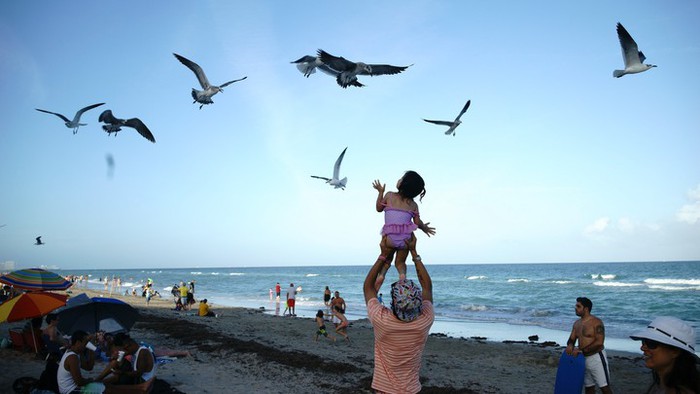We Have to Grieve Our Last Good Days
Why people dwell on their final pre-pandemic memories
For me, it’s the last time I swam in the ocean. It was a February evening in Florida, and I didn’t know that the people I was there with would be the last new friends I’d make, on a work trip I didn’t know would be the last I’d take.
Everyone else seemed content to sit on the sand and look up nearby restaurants on the internet. But I felt like maybe I’d regret it if I didn’t go in. So I changed into a bathing suit I didn’t know I was wearing for the last time, and I swam out just far enough to feel free but still safe. Two things I haven’t felt since.
The water had a bite. I can still see the colors of the sunset if I close my eyes.
You have your own ocean, probably. The memory from Before that you can’t help returning to. The last concert you went to, the last hug you had with a distant loved one, the last trip you took to work maskless and unafraid. The last time you didn’t know it would be the last time.
These memories became a common topic of conversation and the object of a sort of hyper-nostalgia as huge swaths of people found themselves suddenly, indefinitely confined. Now that it’s been nearly a year since the pandemic officially became a pandemic, social media and our human tendency to mark anniversaries are conspiring to remind us anew of all the things we used to have just 12 months ago.
Therapists told me that this grief can manifest in many ways we may not recognize as grief—anger, irritability, sleep disruption, anxiety, even digestive issues. And it can manifest as dwelling on the Last Good Day.
The Last Good Day is a concept I was introduced to in John Green’s novel The Fault in Our Stars. He identified it as a trope in stories about cancer patients, in which the pain lessens enough for the character to enjoy themselves one final time. That’s not the context in which most of us experienced our last good pre-pandemic day, but one thing he wrote still rings true: “The problem, of course, is that there’s no way of knowing that your last good day is Your Last Good Day. At the time, it is just another good day.” It takes on significance only in retrospect.
When someone dies, it’s common to reflect on the last moments you spent with that person. And it’s only natural that in the midst of the massive, multifaceted losses caused by the pandemic, we would do the same. “To some degree, we’ve idealized what that last experience was like,” Ajita Robinson, a grief and trauma therapist based in Maryland, told me. “Those memories become amplified.” We may rake over them for signs of the change that was about to come in an attempt to understand our new reality, or just replay them for comfort.
“When you’re in a highly stressful situation, the human body knows it’s not feeling the way it normally does,” Pauline Boss, a family therapist and professor emeritus at the University of Minnesota, told me. “It’s typical to think back to: When did I not feel this way? You remember This is the last time I had fun; this is the last time I felt relaxed.”
Boss’s Last Good Day was March 10, 2020—her 32nd wedding anniversary. “We were a very social couple, but [my husband] was in a wheelchair and not very healthy. We went out to eat, and I remember being slightly wary because I’d heard of the virus. But there was only one other table in the entire place where someone was sitting, so I felt safe. We had a lovely, lovely anniversary meal together. After March 10, we never went out again.” Boss’s husband’s condition worsened, and he died (not from COVID-19) on September 22. Her Last Good Day, she said, “was our last hurrah.”
Millions of people like Boss are mourning the experiences and sensations of the pre-pandemic world while also mourning loved ones. There are so many things to mourn—obvious and invisible, devastating and subtle—that we may have difficulty talking about and honoring what we’re experiencing. Especially while it’s still happening. Still. The word of the year, perhaps, in both of its meanings. A lack of motion, and an exhausting ongoingness.
But it’s too much, isn’t it? To carry this weight and politely pretend that it doesn’t make us stumble because others are carrying more? “What that does is set up a competition of whose loss is better and whose loss is worthy,” Devine said. “As if there is a finite amount of sadness in the world and you shouldn’t take more than your share.” She thinks that we can respect all the different losses people are experiencing without suggesting that they’re equal. “When we normalize and respect our own losses, that gives us the energy to respect other losses. When we’re stingy, that’s when we get into compassion warfare.” Those who’ve lost “more” resent those who’ve lost “less,” while those who’ve lost “less” may think they don’t have permission to mourn.
Our last times are losses, and they need to be grieved along with everything else. Boss suggested some kind of ritual: “Burn a candle; put a balloon in the air. Someone should be with you, or if they can’t be, tell them. The way we deal with grief is to share it with someone else. You dishonor it by not noticing it as a loss.” These small, private griefs add up: If we each lit a candle for each of our last times, the whole world would be on fire.
I don’t mean to say there’s been nothing good to hold on to this past year, but the bar for a “good day” has lowered dramatically. Working out, getting outside, making it through your kid’s Zoom school day with neither of you having a meltdown—these have become huge accomplishments. A memorable day might just mean going to the store; seeing a friend outside and masked is a massive treat. Perhaps in some ways we’ve come to better appreciate the little pleasures that we once enjoyed so frequently, they didn’t even bear remembering. But we also know that “pandemic good” is a short measuring stick.
In making sense of the year we’ve lived between Before and After, Boss suggested that we strive for “both/and” thinking, as opposed to “either/or.” You can be both happy and sad. You can appreciate the good things you have now while missing everything you’ve lost. You can be lucky and not be okay. Holding together thoughts and feelings that may seem to be in conflict “will lower your stress,” Boss said.
There will be a next good day. Not “pandemic good,” but better. What that may look like, we can’t know, but it seems almost certain that we’re closer to the next good day than to the last.
Until then, I’ll remember: There was a time I was free, I was safe, and I floated on the waves.

